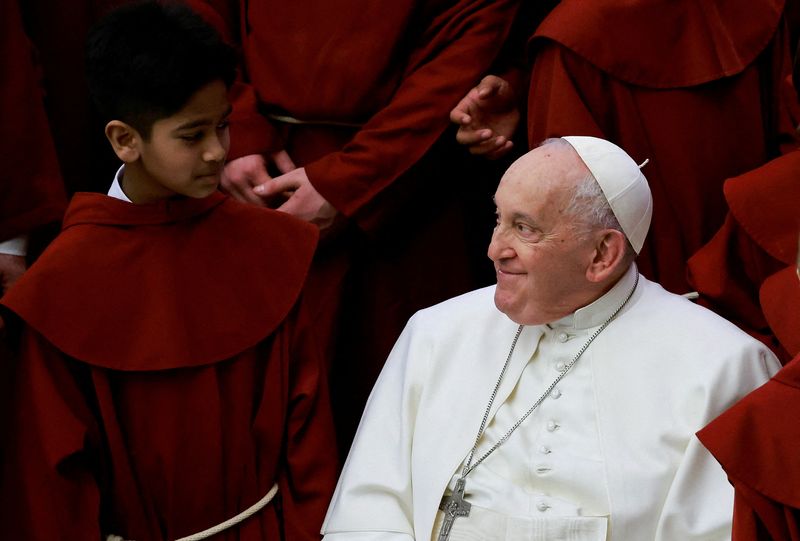
©Reuters. Pope Francis smiles at a young member of a choir on the day of his weekly general audience, in the Paul VI Hall at the Vatican, February 28, 2024. REUTERS/Yara Nardi/File Photo
2/3
By Filippo Pullella
VATICAN CITY (Reuters) – Pope Francis, increasingly frail and shaky at 87, takes a trip down memory lane and talks about his hopes for the future of the Roman Catholic Church in a new book that reflects on his life and its intersection with major world events.
“Life – My Story Through History,” a memoir written with Italian journalist Fabio Marchese Ragona and published by HarperCollins, goes on sale March 19, the 11th anniversary of Francis’ inauguration as the first Latin American pope.
While offering little that is new, the 230-page book is a breezy, conversational read that begins from his childhood in Buenos Aires to the present.
It is punctuated by events including World War II, the Holocaust, the Cold War, the 1969 moon landing, the fall of the Berlin Wall in 1989, the attacks of September 11, 2001, and the resignation of Pope Benedict XVI in 2013.
Francis, whose health has recently shown signs of deterioration with successive attacks of bronchitis, hospital admissions and walking difficulties, reiterates that he has no intention of resigning like his predecessor unless “a serious physical impediment arises”.
He jokes that while some of his conservative critics “might have hoped” that he would announce his resignation after a hospitalization, there is little to no risk because “there are many projects to complete, God willing.”
He again defends his recent decision to grant blessings to people in homosexual relationships, reiterating that these are not blessings for the union itself but for individuals “who seek the Lord but are rejected or persecuted.”
The Church, he says, “does not have the power to change the sacraments created by the Lord” and that “this (the blessings) does not mean that the Church is in favor of same-sex marriage.”
HOPING FOR A HUGGING CHURCH
Addressing the controversy over the recent ruling, he says: “I imagine a mother Church that embraces and welcomes everyone, even those who feel wronged and have been judged by us in the past.”
Francis writes that even if some bishops refuse to bless people who have homosexual relationships, as in Africa, “it does not mean that this is the antechamber of schism, because the doctrine of the Church is not questioned.”
Throughout the book he relies on historical events as backdrops to launch appeals relating to current, sometimes similar, situations.
Speaking of the Second World War, he writes that even today “Jews continue to be stereotyped and persecuted. This is not Christian; it is not even human. When will we understand that these are our brothers and sisters?”.
Recalling when he first heard about the atomic bombs dropped on Hiroshima and Nagasaki in Japan at the end of the war, he writes: “The use of atomic energy for war purposes is a crime against humanity, against human dignity and against any possibility of a future in our shared home.”
Reflecting on the September 11 attacks against the United States by Islamists, Francis says: «It is blasphemous to use the name of God to justify massacres, murders, terrorist attacks, persecution of individuals and entire peoples, as some still do. No one can call on the name of the Lord to cause evil.”
The pope dismisses as “fantasy, obviously made up” recent reports in conservative American Catholic media that he has changed the rules of conclaves to allow nuns and lay people to enter conclaves to choose future popes.
On the lighter side, Francis talks about compatriot Diego Maradona’s controversial “Hand of God” goal in Argentina’s 1986 World Cup quarter-final against England, which the referee allowed because he didn’t have a clear vision that demonstrated that Maradona had used his hand.
Years later, when Maradona visited the pope in the Vatican, “I asked him, jokingly: ‘So, which hand is the guilty one?'” Francis writes.